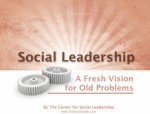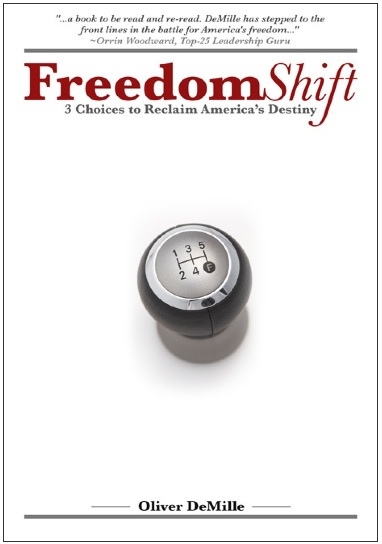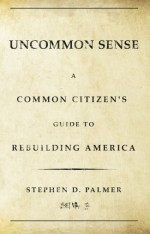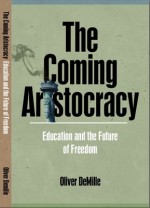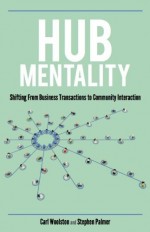Monthly Newsletter: Conservatism & Liberalism Reconciled by Oliver DeMille
Published: Tue, 03/01/11
 "Empowering Ordinary Citizens to Make an Extraordinary Difference"
|
|
The Intellectual Roadblock to Modern Progress
*Note to Subscribers: Oliver is now offering "Social Leader Daily," a daily email with bite-sized insights and inspiration on freedom, leadership, education, and more. Click here to subscribe now.
Liberals and conservatives have been locked in a debate for
many years.
This debate is holding back our progress as a free nation, and no real
solution is yet in sight.
The problem is deeper than most people realize,
because it is based on an intellectual roadblock and few people know what it is
or what to do about it.
Until we understand
this great roadblock, we will remain stuck
in this rut.
Liberal versus
Conservative
The ultimate "conservative" human is the hero, consistently
rising above all challenges and overcoming all difficulties, usually at major
personal sacrifice, to help others and/or oneself.
A major "liberal" agenda, in
contrast, is to point out that every man and women is ultimately flawed, weak,
and broken, but that sincere and genuine service to those in need can redeem
anyone.
The liberal view is thus romantic, while the conservative perspective
is heroic.
Many conservatives yearn for "a hero, a leader, someone to
take us where we need to go, a Washington, a Jefferson, a Teddy. We need a Reagan
to say, 'Tear down this wall!' We need great leaders to make this nation even
greater, and to do great things in the world. Not to force us through
government programs, but to lead us as truly free citizens." This is primal
conservatism.
Many liberals take a different approach: "Washington, Jefferson,
Teddy and Reagan were, of course, flawed like all of us, as were Hamilton,
Lincoln and FDR, but some of them achieved greatness anyway because they
dedicated themselves to emancipating the enslaved, helping the little guy, and
increasing social justice for the voiceless and powerless. There is so much
that can be improved in this world, and it is up to us to make it happen."
Another intellectual debate between conservatives and
liberals deals with the soul. The more we develop technology, the more it seems
to take on a life of its own.
Indeed man, in one view, is a biological machine,
but infused with a soul, an inner eternal essence that is free of, albeit at
times part of, this world.
The debate about whether or not man has a soul
(monism vs. dualism) is millennia old, but it has become even more interesting
with the advent of the technological age.
The world is either living or non-living, in the modern
worldview, but unfortunately advanced technology and science blurs this
perspective.
Physicist David Bohm took on this paradox directly:
"The electron, in so far as it responds to a meaning in its environment, is observing the environment. It is doing exactly what human beings are doing." If the universe has a goal, and everything is bending to its design, then all
things have a soul or a driving inner essence.
Whether or not humans have a soul,
modern science sometimes very nearly suggests that everything has something
akin to soul. (For example, see The Tao of Physics by Fritjof Capra.)
Is man an initiator, a "prime mover," a creator, or simply a
component part?
Is he hardware running the universe's (or God's) programming, software driving
the material world, or something else?
The great books of East and West are filled with debates on these topics.
The way intellectual debates impact mass thinking is seen in
science.
A generation raised with a view of the atom as clearly understood
docile electrons orbiting around a nucleus with order and predictability sees
economics and government much differently than a later generation taught that
electrons don't "orbit" at all--they blink in and out, are only near the nucleus
an undetermined minority of the time, and could be literally anywhere the rest
of the time.
The first generation huddles around its political parties, the
second independently jumps around in its politics.
Relativity, The Heisenberg Principle, Quantum Theory andString Theory have raised more questions than they have answered about the
modern belief in dualism--whether everything is either physical or not physical.
As Nobel Prize winners debate (some on the side of both matter and spirit as
reality and others on the side of matter only), a few point out that there is
really no empirical proof for String Theory or various other popular scientific
theories.[v]
We are proceeding on...what? Faith? Hope? A desire to help
people (charity)? Educated guesses?
These theories are certainly elegant, and
many of us want them to be true, but without evidence...well, even most of the
lead scientists only call them theories.
Of course, all this hypothesizing,
calculating, analyzing and discussion is often good science.
But will we, as Ray Kurzweil suggests,
reach a "singularity" at some point early in the 21st Century where
technology becomes intelligent enough to begin literally thinking, feeling and
reproducing on its own? Is there actually
a ghost in our machines?
Or, put another way, has matter actually been alive
all along?
Fritjof Capra's collection of ideas
from Hindu, Buddhist, Jewish, Islamic, Christian and other religious thinkers
along with Einstein and various modern scientists supporting this very point is
impressive.
Does matter have spirit? It's a fabulous question, one debated in
religious, philosophical and scientific circles for centuries.
The artists, by the way, are less doubtful. Art has long
held that great works like the Parthenon, the Mona Lisa, Beethoven's Fifth
or Picasso's works carry a spirit all their own--one which has real and
measurable impact on people.
Generations of attendees of Shakespeare productions
could well attest of the phantom clearly in the theatre.
But modern man automatically discounts such appeals to
unscientific feelings.
Indeed, this may well be the real problem. If we reject
ongoing evidence because we don't know exactly how to measure or interpret it,
are we truly behaving scientifically?
Shouldn't we figure out a way to assess,
categorize and study what we feel, experience and sense?
Such fringe science
may be part of our future but it is seldom accepted in our time.
In the political realm, conservatives frequently apply
religious language to such things, effectively though not purposely taking them
out of the national dialogue.
In contrast, many liberals are more comfortable
with non-religious secularism or even personalized spirituality, but they share
little common language with which to converse about these things with those
outside their customary groups.
No national dialogue is really possible on this topic
without a widely-accepted common language--regardless of how confidently
scientists, mathematicians, religionists, spiritualists or secularists think
their own dialect should suffice.
Ironically, each of these groups, and others
such as libertarians or environmentalists or self-help experts, spend a great
deal of time talking about these same themes--but seldom to each other.
The difficulty is the paradox itself: a large segment of
society only accepts something as true if it is scientifically proven, but we
cannot currently prove or disprove whether or not matter and machines are "alive."
We can change the definitions of the word "alive," or argue about what such a
definition may be, but this leaves few people satisfied or convinced.
The Integral
Approach
Ken Wilber is an exception to this rut, and his multiple bestsellers
show that there is at least the beginning of a widespread market for
integrating these views.
Wilber wrote in 2006:
This applies to national, ethnic, religious, gender,
scientific, artistic, professional and various other cultural expressions.
As a
result, some people are attempting to search out and identify truth and wisdom
from all sources.
While this is officially called "The Integral Approach," something
similar has historically been called a great classical or great books
education--learning the best by coming face-to-face with the best thinkers,
leaders and creators down through history and across the globe.
One central idea of the Integral Approach is that a person
will interpret what he experiences in life based on the stage he is at: me, we,
or all of us.
These
levels progress from lower to higher. In other words, a conservative person at
the "all of us" level is always going to understand things better than a
liberal individual at the "me" level,
just as a conservative at the "we" level will be less wise or understanding
than a liberal at the "all of us" level.
Taking this a step further, at the "all of us" level nearly
all of the conflicts between liberals and conservatives effectively disappear.
Indeed, for example, at the "all of us" level a religious believer is firm in
her faith and deeply respectful of her atheist neighbor and glad that such
diversity helps the world be more thoughtful, wise, interactive and, yes,
sacred.
The atheist friend, also at the "all of us" level, likewise celebrates
her neighbor's religious beliefs and how they benefit pluralism, opportunity
for dialectal progress and cooperative service to humanity.
The first speaks of
charity, faith, and reverence for life, the second of philanthropy, scientific
progress and social justice--but they mean nearly the same things and can
frequently cooperate in doing good.
In our time of partisan clique-opinion political passions,
some conservatives may respond, "This all sounds like a socialistic
ultra-liberal politically correct nightmare."
Some liberals might call it, "An
ultra-right, over-religious mind-control utopian scheme trying to inculcate one
set of values on everyone."
These potential responses prove the Integral Approach's
point, however. They both come from the "me" or perhaps "we" levels.
Einstein
seemed to understand this. He said,
"Science without religion is lame, religion without science is blind." If only we could learn to cherish and apply true wisdom--whatever the source.
Whatever the Integral Approach accomplishes, and however it
may or may not fall short, in a world with global travel, global technology,
global communication and global relationships we better learn from the best of
all cultures.
Nobody has a monopoly on wisdom, and humanity can use all the
acumen it can get.
A Block to
Progress?
With the benefit of all this background, we come to the main
point of this article: Modernity is blocked in its progress by a mostly unknown
debate that is currently at an impasse.
Until we clearly understand this block,
articulate and widely discuss it, and come to a majority conclusion that the
people of the world can accept and apply, we aren't likely to make much real
progress in the 21st Century.
For those who believe that freedom, opportunity through free
enterprise, and a system that encourages widespread prosperity should be given
to all people in the world, that these are in fact inalienable rights, this roadblock
is of deep concern.
So what are we still arguing about? John Stuart Mill must
have understood this when he said,
"In all intellectual debates, both sides tend to be correct in what they affirm, and wrong in what they deny." When liberals argue for tolerance, helping those who suffer, giving more
opportunity to the disadvantaged, spreading the rights and blessings of the
Constitution to all people regardless of race or gender or economic status, and
taking societal responsibility to improve the world, they are nearly always
right.
The same is true when conservatives promote individual
responsibility, limiting government to roles where it is best suited to serve
and leaving other things to better-suited private institutions or the
individual, encouraging opportunity and progress through a strong free
enterprise system, maintaining strong national security to protect freedom and
prosperity from those who would attack it, the importance of morals and virtues
in society, and the central role of the family.
Here's the problem: When those who believe in a world of
true caring and helping the downtrodden also deny freedom and promote a
doctrine of increased governmental force, and when those who support freedom,
free enterprise and personal responsibility through limited government also
adopt a dogmatic attachment to blatant self-promotion that neither accepts nor
feels responsibility for the plight of the poor, something is wrong.
It is in the denial of freedoms and responsibility for
others, the promotion of force and leaving the poor to their own efforts, and
in the attacks on others that both major modern political viewpoints fall
short.
Both sides would like to move past this argument, but the big
intellectual block has so far proven immovable.
Understanding the
Big Block
What exactly is this block to modern progress? Three
thinkers (Ken Wilber, Thomas Sowell and Steven Pinker), coming from different
perspectives and significantly diverse backgrounds, separately arrived at the
same conclusion: The intellectual blockage of our time is hybridized political
theory.
Each used different terminology, but the concepts are similar.
Since this is patently an intellectual problem, it is little
surprise that most people are unaware of the crisis or the debate that
surrounds it.
Indeed, since practical politicians have very little time for
intellectual debates, and since many intellectual debates are usually
irrelevant to current policy needs, few of our leaders know about this trouble
either.
Here we are at a major societal impasse, stuck in a system
that doesn't work, while most of our ultimate leaders (the voting citizens) and
active leaders (in Washington) are unaware of the problem.
Our citizenry votes,
gets more disappointed at the results, then votes again--over and over with
increasing frustration. Leaders such as George Bush, Bill Clinton, George W. Bush
and Barack Obama campaign with promises of change--only to see things become
more and more the same.
Indeed, as irritated as American voters are over the
problems in Washington, imagine how incredibly aggravating it must be for
presidents and other political leaders who sincerely do want to change the
negative cultures and systems inside the Beltway.
Things won't change until the Great Conversation figures out
how to overcome our current big block -- hybridized political theory.
More precisely, it is the current
hybrid which combines a sick version of "all of us" with a healthy, but lower,
version of "we."
In literal terms, "all of us" refers to the inclusive belief
that all Americans and indeed all human beings on our planet deserve certain
inalienable rights--and that all people and governments are living below our
potential until we extend these rights to everyone.
This "all of us" philosophy was most articulately promoted
in The Declaration of Independence
and has yet to reach its full expression.
Too many people, most people in fact,
are still not secure in their inalienable rights, and until America helps this
reality occur it will always be broken--it has a mission to mankind, and it is
failing to deliver.
In contrast, the "we" political philosophy is based on the
lower perspective that "my group" is more important than other people or groups
and must be protected and promoted at the expense of other people. Another
phrase for "we" is "me and mine."
Of course, an even lower political
perspective is the philosophy of "me," a selfish, self-centered view: "I am the only one who matters" and "I'll do
whatever it takes and step on whoever I need to in order to get ahead."
A step higher than "me" beliefs are the politics of "we": "My race, my
religion, my social class, my family, my friends, my nation, etc. are more
important than everyone else and we will do whatever it takes and step on
whoever we need to get ahead and stay on top."
Unfortunately, this "we" perspective
has dominated most of world political history.
Blocks on Left and
Right
If the debate were simply between the selfish "we" and the
inclusive "all of us," it would have been settled shortly after World War II--if
not earlier.
But the problem is more complex, according to Wilber. At the time that "all of us"
was gaining popularity in the world, it happened to coincide with the rise of
modernism, industrialism, secularism and American collectivism. It borrowed
liberally from each of these, and in so doing adopted some positive and also
some negative characteristics.
In this process the "all of us" view of society took on
aspects of Marxism, making it a hybrid of Madison and Marx.
As Thomas Sowell
noted, Marxism itself is a hybrid of the Tragic struggle of the poor and weak
to gain economic opportunity and political power, and of the future Utopian
vision of using government force to serve the plight of the underprivileged.
Arising as it did in the late 19th and early 20th
centuries, the widespread view of a political "all of us" unfortunately
hybridized itself with Marx's teachings; for many who believe in the ideals of
" all of us" over the lower and more selfish goals of "we," the world is split
into those who are inhumanely self-interested and those who want government to
enforce equality.
The challenge: We live in a world where the two
major choices are "Selfish Me and Mine" versus "Government-Forced Caring for
Others."
In fact, both choices are below us. And because of this, neither can
win the battle and lead the world forward.
When "Selfish Me and Mine" gains a
lot of support, those who want a truly caring and better world object and pull
back on its momentum.
Then, in consequence, when "Government-Forced Caring for
Others" begins to gain strength, those who truly want a free and better world
for all rise up and slow its growth.
We have been at this battle for a long time now--but with
little progress. It will likely continue until we can find a way to fix the
intellectual impasse.
The world wants to move to a "Free and Cooperative Caring
for Others and Improving the World," but to do so the intellectual debate must
be resolved.
The regular citizens may not know the details of this intellectual
altercation, but they do see that something is wrong with both the "Selfish Me
and Mine" approach and the "Government-Forced Caring for Others" agenda.
Nearly every hotly contested issue of our time has roots in
this debate. We live in a two-sided battle of culture, but neither side is
morally superior or psychologically better than the other.
Neither resonates
with most citizens. Even most of those who for partisan purposes have chosen a political
side are frequently disappointed with the leaders and policies of their own
party.
Still, the nobility of American liberalism is where it truly
stands for helping the downtrodden:
Thank goodness for people who stand for this.
The nobility of American conservatism is that it expects government
to do what it can, within the limits of the Constitution, and to leave the rest
to private entities and people.
Since government has always been the greatest
threat to freedom in history, this is the only way to keep government from
becoming an enemy to all--the poor and weak as well as the middle class.
In
fact, when the government becomes all powerful, even in the name of helping the
poor, the upper class that controls government gains almost total control over
the rest of society.
The most important way to protect freedom is to limit
government. Thank goodness for people who stand for this.
Solutions
When they are thinking about it at the deepest levels, most
conservatives agree with the caring goals of liberals and most liberals agree
with the freedom goals of conservatives.
Both groups want real freedom and real
caring.
There are, of course, a few liberals who want overreaching government
and a few conservatives who want the poor to suffer--but these are very small
factions.
Nearly all citizens are believers of "all of us," the healthy kind of
"all of us" which adopts freedom and
caring instead of forced government caring.
What is needed is for the intellectuals to allow the "all of
us" philosophy to flourish in practice.
The "pure" political models of monarchy
and aristocracy kept most of humanity in a sort of economic serfdom for many
centuries.
The American framers overcame much of this with a Constitution built
on branches and levels of government with separations of powers, checks and
balances.
But even with such a powerful Constitutional model in place,
the American culture refused to extend its benefits to everyone.
The resulting
Machiavelli-Madison hybrid proved long uncaring for the plight of those caught
in slavery, racism, religious bigotry and unbending class and gender dogmas.
The later Progressive-Era hybrid of Madison-Marx kept the lower and middle
classes from fully living the American Dream.
Through all this, the hybrid of Madison-Smith (Adam) brought
a great deal of prosperity and freedom to many Americans of all backgrounds.
What is needed today is a Madison-Smith-Gandhi hybrid which
combines Constitutional principles with a return to full free enterprise and a
socio-cultural approach that sees all human beings as part of "all of us."
Ken
Wilber put it this way:
"This is the great and exhilarating call of global politics at the millennium. We are awaiting the new global founding Fathers and Mothers who will frame an integral system of governance that will call us to our more encompassing future..." I realize this is a lot of commentary to say something very
simple: Most Americans are increasingly adopting a belief system of caring deeply
for the downtrodden around the world and also in protecting freedom by keeping
the government in the bounds of its Constitutional limits.
We are mostly
independents now, and beyond official independents the majority of both
Republicans and Democrats share this new perspective.
Indeed, as a culture we
have moved from selfish "we" to inclusive "all of us."
Unfortunately, our party system (which, by the way, has
never been in the Constitution) and subsequently most of our national
leadership systems haven't yet made this shift in thinking.
As freedom thinkers
and political philosophers, our citizens haven't solved the confusion. Few of
us, leaders or citizens, give it any thought at all. We see that things aren't
working, but we don't realize the root cause.
The root cause of our challenge is this: Society hasn't fully
accepted the fact that government must be limited and that we must find effective
private solutions to the problem of the poor, weak and struggling.
We must rely
less on government to solve our challenges, and we must as a society come
together and passionately find effective ways to help everyone succeed
economically.
This is real, not utopian or idealistic, and now is the time.
Those who see the world as competing groups must sincerely
change to a worldview where all people in the world are genuinely loved and felt
to be of equal importance, and those who want a more caring world have got to
stop seeking to force their plans through government.
Government certainly has
its place, but when it moves beyond its basic roles freedom is reduced for all
except the very elite.
We need a lot more active caring from all, and more limited
government in every nation.
The scientist Max Planck said,
"A new...truth does not triumph by convincing its opponents and making them see the light, but rather because...a new generation grows up that is familiar with it." For this intellectual impasse to be over, two things must occur:
That's a lot to obtain. This is hard policy. But this is
precisely the challenge of our generation.
Our society will remain broken as
long as a third of the people believe that government should solve all our
social/economic problems and another third thinks that helping a stranger from
Guatemala find real prosperity and happiness is somebody else's concern.
The world's problems are not the government's challenges.
They are yours. And mine.
And until we get serious about fixing them for real,
without the government, with all our abilities, resources, passion and
dedication, we can kiss goodbye to our hopes of progress toward a truly free, prosperous
and happy nation and world.
*******************  Oliver DeMille is the founder and former president of George Wythe University, a co-founder of the Center for Social Leadership, and a co-creator of TJEd Online. Oliver DeMille is the founder and former president of George Wythe University, a co-founder of the Center for Social Leadership, and a co-creator of TJEd Online.He is the author of A Thomas Jefferson Education: Teaching a Generation of Leaders for the 21st Century, The Coming Aristocracy: Education & the Future of Freedom, and FreedomShift: 3 Choices to Reclaim America's Destiny.
Oliver is dedicated to promoting freedom through leadership education. He and his wife Rachel are raising their eight children in Cedar City, Utah.
Connect With Oliver: |
Connect & Engage
Recent Blog Articles
By Kyle Roberts
By Oliver DeMille
By David Grant
By Orrin Woodward By Shanon Brooks By Oliver DeMille
By Garrett Gunderson
Free PDF Downloads
|
www.TheSocialLeader.com |

